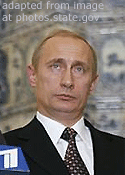The Bully Pulpit: Experts See Signals to the Party and to the Public in Putin's First Interview Since Announcing His Presidential Ambitions

file photo
Prime Minister Vladimir Putin appeared last evening on Russian national television in a 30-minute interview with the heads of three leading television stations in Russia, giving his first interview since his announcement to run for (and win) the presidency in 2012. Critics say that Putin far outclassed his junior Dmitry Medvedev in terms of political presence and confidence; yet they disagree on how much of the content of the interview was actually new, and how much is simply the same rhetoric that has been recycled in other major interviews since the United Russia conference last month.
Strolling smartly through an office at his Novo-Ogaryovo residence outside Moscow, Putin brusquely greeted his interviewers from Channel One, Rossia-1 and NTV television stations, telling them: "I'm listening!" The first question, of course, was why Putin had decided to return to the Kremlin in 2012. "I never sought this post," replied Putin humbly, though unbelievably. "Moreover, at the time when it was suggested to me, I even expressed my doubts about whether it was worth doing, keeping in mind the enormous amount of work and the colossal responsibility for the fate of the country," said Putin. But, he continued, "if I set myself to a task, I try to carry the issue through either to its logical conclusion, or to its maximal effect."
What the interview lacked in tight answers to criticism of the Kremlin or Putin's future plans for Russia the premier made up for with reminders of the historical precedents for his third presidency (Franklin D. Roosevelt and Helmut Kohl), as well as ominous warnings of where Russia would be without him. "It's enough to make two or three missteps and everything that happened before [in the 1990s] can catch up with us so quickly that we won't even realize it," said Putin. "Everything in our politics and in our economy has been done as a tailor tack."
Did the interview present anything new about what Russia should expect from Putin after the March elections? Nikolai Petrov, an analyst on local politics at the Carnegie Endowment, said that the speech held several important moments: firstly, in Putin's explanation of why he felt he had to return to the Kremlin, and secondly in expanding on the government's decisions between moving toward reforms of its economic and political programs and then backing away from them.
While Putin's speech was described by his spokesman, Dmitry Peskov, as a follow-up to Medvedev's interview with the same television stations earlier this month, Putin came off looking far superior, noted Petrov. "To compare this interview with the recent one with Medvedev and his supporters, Putin is much more professional, much more confident, much more sincere. I would not say that it was empty, unlike Medvedev's," Petrov said.
Medvedev's highly anticipated pressers and interviews have turned into banal affairs recently. When he was asked the same question as Putin, namely why the tandem had decided that Putin should return to the Kremlin, Medvedev told the same television stations that Putin's ratings were "somewhat higher," and that he should lead the party forward into the next presidential elections. This month, in anticipation of another press-conference, Medvedev tweeted: "To those who are interested in my plans watch Vesti-24 at two o'clock today." Little came out of the interview, except that Medvedev affirmed he would stay in politics.
Those hoping to see journalists finally stick it to an authority figure had a little more luck with Dmitry Peskov's recent interview on Dozhd television, when he was cornered by five rather more independent journalists. But the great revelation from the interview was firstly that Putin's dive at Fangoria earlier this year was a fake, and the sixth century urns he dredged up there were planted, and secondly that, if we're headed into a period of Leonid Brezhnev's stagnation, then overall the Brezhnev period was not so bad.
Putin continued in that vein last night, similarly taking on the stability of the Brezhnev era while discounting the stagnation with which many now associate it. Yet the very repetitiveness of the recent interviews is a signal from Putin to the United Russia party and party loyalists, said Mikhail Vinogradov, the head of the St. Petersburg Political Fund think tank. "There was little new or revelatory in the interview, but rather what Putin was doing is framing what the major events will look like through the upcoming election. It can be seen in particular as a signal to many of those functionaries in the party," said Vinogradov. "This was an interview that would be interesting to those who are loyal to the party. I would guess that those not interested would probably discount it," he added.
Petrov, meanwhile, said that Putin's appeal in the interview would likely rebuild interest among the former party faithful, at a time when due to increasing financial difficulties the government could no longer afford to buy loyalty by simply spending cash on social programs. "Legitimacy is of major importance to the authorities today," said Petrov. "He's saying a lot more about direct democracy here, and in many ways he's switching his political approach to focus on popularity."
Russia, Government, Politics - Russian News - Russia - Johnson's Russia List

